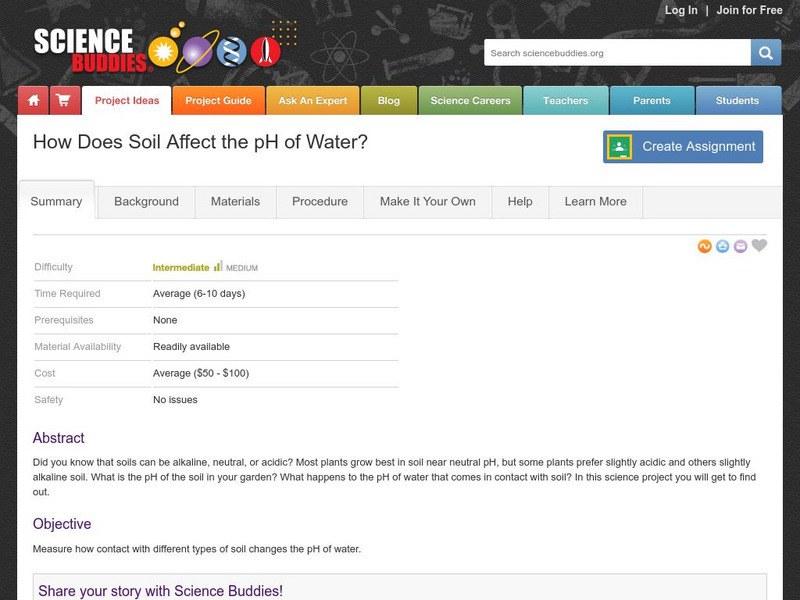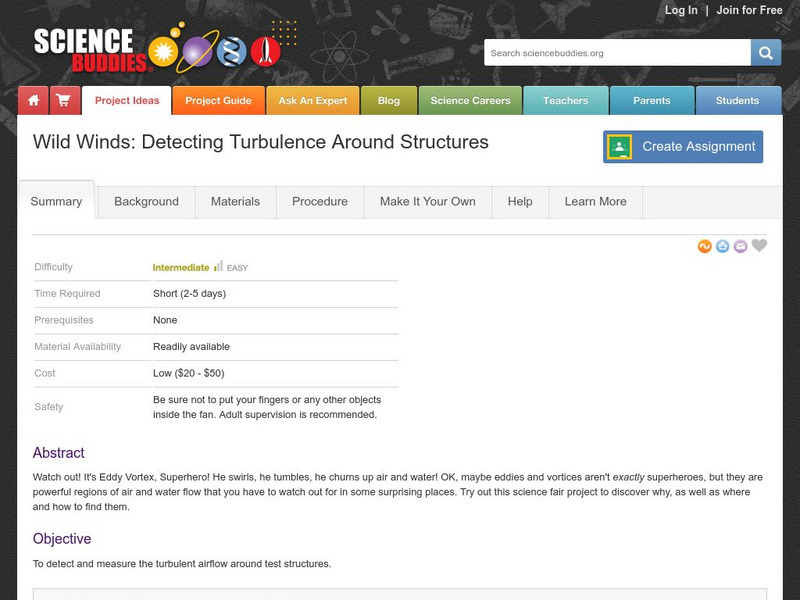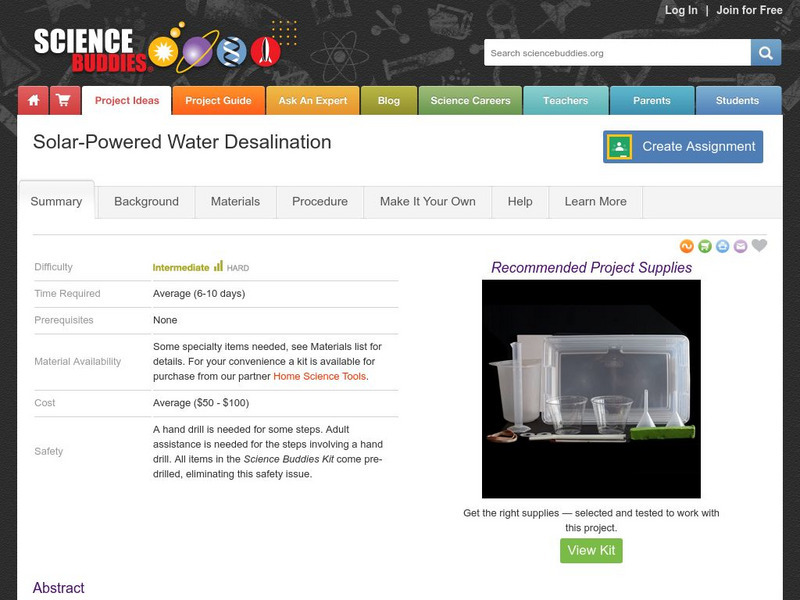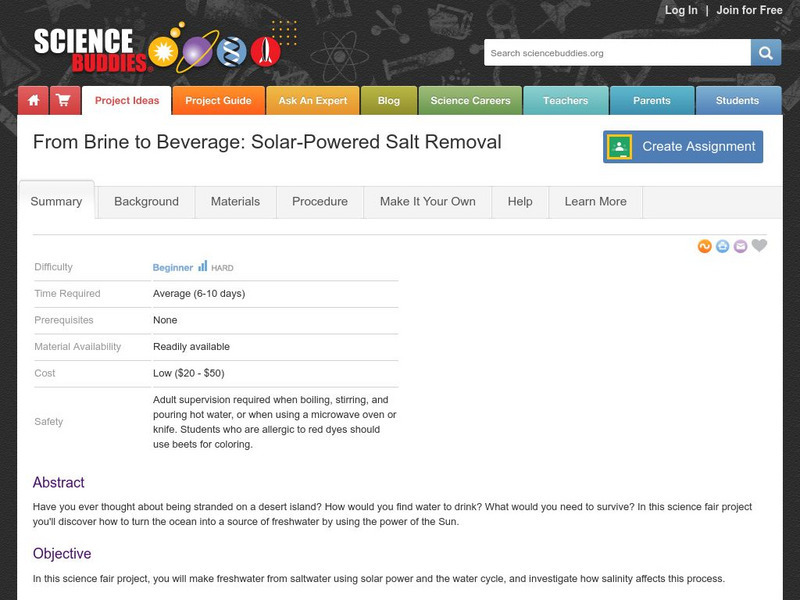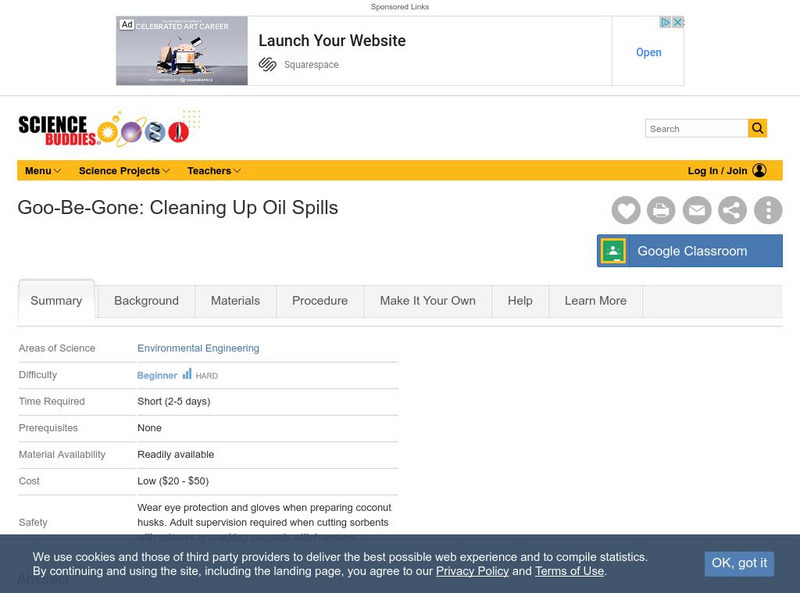Hi, what do you want to do?
Georgia Department of Education
Ga Virtual Learning: Ap Environmental Science: Water Pollution and Treatment
Students learn about water management, treatment and purification- global issues that must be addressed to ensure a continued supply of safe water for the growing human population and for the organisms with which we share this planet.
National Institutes of Health
National Library of Medicine: Environmental Health Student Portal
An entire site of resources specifically for environmental science and how it is linked to human health. Topics include water pollution, air pollution, climate change, and chemicals.
Science Buddies
Science Buddies: Dust Busters: How No Plow Farmers Try to Save Our Soil
In this environmental science fair project, students will build models of fields prepared by plow-based and no-till methods, and see which ones are best at retaining soil moisture and preventing surface runoff.
Texas Commission on Environmental Quality
Tceq: Lesson Plans & Resources for Teaching Environmental Sciences [Pdf]
A large collection of lesson plans on environmental topics. The lessons are broken up into the broad categories of air, water, and waste, and look at issues around quality, pollution, conservation, and recycling. There are activities for...
Science Buddies
Science Buddies: It's Raining, It's Pouring: Chemical Analysis of Rainwater
Here is an interesting project that could be approached from several different scientific angles: Environmental Science, Weather & Atmosphere, Chemistry, or Plant Biology. You can probably think of your own variations to emphasize...
Science Buddies
Science Buddies: Froggy Forecasting: How Frog Health Predicts Pond Health
Have you ever heard the expression "a canary in a coal mine"? In the 1900s and earlier, coal miners brought canaries with them into the mines to act as early warning signals. The canaries were very sensitive to low levels of dangerous...
Science Buddies
Science Buddies: Using Daphnia to Monitor Water Toxicity
In a bioassay, a living organism serves as a detector for toxins-the same way canaries were used in coal mines to detect invisible toxic gases. In this project, water fleas (Daphnia magna), a freshwater crustacean, are used in a bioassay...
Science Buddies
Science Buddies: Recycling Greywater: Can Plants Tolerate It?
Water is a valuable resource many often take for granted. This exercise however gives you the opportunity to learn about and discover how greywater (water that has been used for washing or bathing) can be used for watering ornamental...
Science Buddies
Science Buddies: How Does Soil Affect the P H of Water?
Did you know that soils can be alkaline, neutral, or acidic? Most plants grow best in soil near neutral pH, but some plants prefer slightly acidic and others slightly alkaline soil. What is the pH of the soil in your garden? What happens...
Science Buddies
Science Buddies: I'm Trying to Breathe Here! Dissolved Oxygen vs. Temperature
To survive, we need oxygen in the air we breathe. Oxygen is also essential for most aquatic organisms, but there is much less oxygen available in water than in air. Learn how to measure dissolved oxygen and then see how oxygen...
Annenberg Foundation
Annenberg Learner: The Habitable Planet: Water Resources
Learn about water as a precious resource in danger of being depleted. Understand the roles that overuse and agricultural use play in the sustainability efforts of this essential resource. Includes video. [28:25]
Georgia Department of Education
Ga Virtual Learning: Ap Environmental Science: Aquatic Biomes and Ecology
Students explore Earth's most important natural resource, water, and learn about how the planet's aquatic biomes thrive and support life.
Alabama Learning Exchange
Alex: Surface Water Testing
In this environmental science lab you will chemically test a nearby creek or pond for dissolved oxygen, pH, alkalinity, hardness and turbidity. This is a field test and will determine the water quality of standing body of water. The lab...
Other
Wet in the City: A Recipe for Clean Water [Pdf]
In this hands-on instructional activity, learners will examine the labels on common household products to determine what hazardess chemicals they contain, then test less toxic alternatives to see their affects on water quality. Students...
Science Buddies
Science Buddies: Smart Watering: Adjusting Your Sprinklers for Optimal Soil
Use this science fair project to learn how to test your soil to see if it is getting the right amount of water from the sprinklers. Project is set up beginning with an abstract, objective, and introduction, followed by a section on...
Science Buddies
Science Buddies: Wild Winds: Detecting Turbulence Around Structures
Watch out. It's Eddy Vortex, Superhero. He swirls, he tumbles, he churns up air and water. OK, maybe eddies and vortices aren't exactly superheroes, but they are powerful regions of air and water flow that you have to watch out for in...
Science Buddies
Science Buddies: How Can Your Faucet Save Water?
Experiment with low-flow faucets and see how much water you can save in your home. The Science Buddies project ideas are set up consistently beginning with an abstract, objective, and introduction, followed by a section on terms,...
Science Buddies
Science Buddies: Heavy Metals and Aquatic Environments
You might know that lead can be toxic, and that you can get lead poisoning from eating or inhaling old paint dust. Lead is called a heavy metal, and there are other sources of heavy metals that can be toxic, too. Silver, copper, mercury,...
US Environmental Protection Agency
Epa: Extramural Research Science Topics
This EPA website has links to many science topics about which the Environmental Protection Agency has concerns.
Center for Innovation in Engineering and Science Education, Stevens Institute of Technology
Ciese Collaborative Projects: Bucket Buddies: Environmental Study
Bucket Buddies is an opportunity for learners to participate in a world-wide environmental study. By identifying organisms in pond water, participating classes can compare their findings, and look for relationships in data. In addition...
Science Buddies
Science Buddies: Solar Powered Water Desalination
Here is a cool project about making fresh water from salt water using solar power, also known as water desalination. The apparatus is made from readily available materials, and the power source is free. As an inventive thinker, you will...
Science Buddies
Science Buddies: From Brine to Beverage: Solar Powered Salt Removal
In this science fair project you'll discover how to turn the ocean into a source of freshwater by using the power of the Sun, and the water cycle. You will ultimately find just how salinity affects this process.
Science Buddies
Science Buddies: Goo Be Gone: Cleaning Up Oil Spills
Oil spills devastate wildlife and our precious water resources. Test the absorptivity of different materials (sorbents) to discover which ones are best at removing oil from water in this brief lab.
US Geological Survey
Usgs: North Carolina District Science Plan
The North Carolina District of the Water Resources Discipline, U.S. Geological Survey (USGS), is committed to collecting hydrologic data and conducting hydrologic investigations of the highest quality. North Carolina District staff...








![Tceq: Lesson Plans & Resources for Teaching Environmental Sciences [Pdf] Lesson Plan Tceq: Lesson Plans & Resources for Teaching Environmental Sciences [Pdf] Lesson Plan](https://static.lp.lexp.cloud/images/attachment_defaults/resource/large/FPO-knovation.png)




